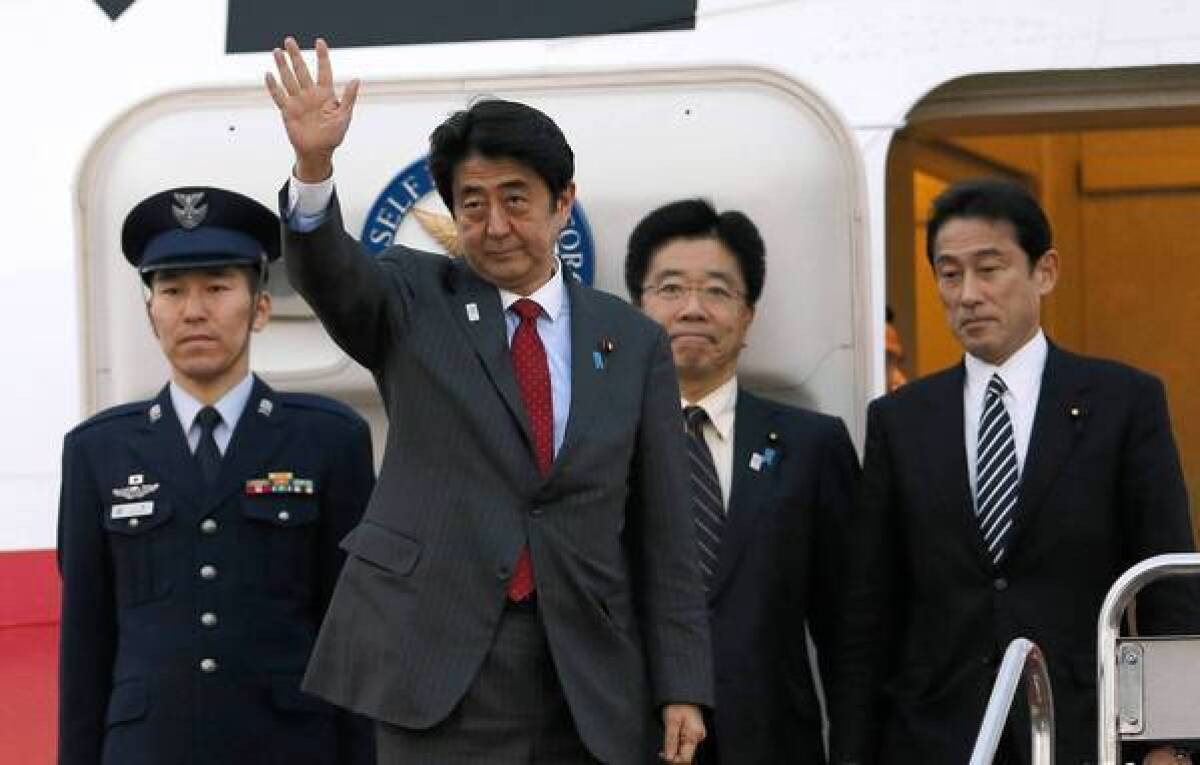At U.S.-Japan summit, China’s presence will be felt

- Share via
WASHINGTON — As Japanese Prime Minister Shinzo Abe arrives for a Friday summit with President Obama, trade will be at the top of the diplomatic agenda along with security concerns, including new threats from North Korea and an escalating territorial dispute over islands near Japan.
On almost every major issue, political and economic, China’s shadow will hover over the talks.
Abe, who took office in December as Japan’s seventh prime minister in six years, will almost certainly push for strong U.S. backing in Japan’s tense standoff with China over the Senkaku islets in the East China Sea, which the Japanese administer but which are also claimed by the Chinese, who call them Diaoyu.
The Obama administration has acknowledged Japan’s administrative authority over the islets and is bound by treaty to protect territories under Japanese administration. Still, analysts expect the two leaders to largely sidestep the issue in public remarks as Obama tries to balance Washington’s close ties to Tokyo with the need to maintain strategic relations with China, an increasingly crucial market and trading partner for the United States as well as North Korea’s closest ally.
When Abe last visited Washington as prime minister in 2007 — he resigned after a year in office — Japan was still the world’s second-largest economy. China has since surged ahead, pushing Japan to No. 3.
“We have important correlated interests, and in particular we and Japan are both very concerned about the rise of China in the region,” said Robert J. Shapiro, a Washington consultant and former undersecretary of Commerce in the Clinton administration.
Japanese officials say Abe’s primary purpose in coming to Washington is to explain his economic agenda to Obama and, more generally, to strengthen Japan’s ties with the United States, which in recent years have been frayed by disputes over the relocation of a U.S. military base in Okinawa and other security matters. Abe has stirred up some excitement in Japan by pushing through new fiscal and monetary stimulus measures to revive the country’s long-moribund economy.
He is enjoying solid popular approval at home, something particularly unusual from a Japanese public that has gotten used to deposing prime ministers.
Now, analysts say, Abe wants to show his constituents that he has U.S. support for his economic policies and that he can manage bilateral relations better than his predecessors did, something that would help in building his credibility as he looks to secure a victory in upper-house parliamentary elections in July.
“With the situation in Asia, we have a lot of problems to bear in mind. There’s a greater need for the two countries to project themselves as having a strong bond of alliance,” said Masato Otaka, minister of public affairs at the Japanese Embassy in Washington.
Obama was to meet with Abe on Friday at the White House to talk mainly about security issues, then have a working lunch at which they were to discuss economic and trade matters.
Still, both leaders will be constrained by domestic political considerations, as well as the China factor.
Perhaps the most urgent security issue facing Obama and Abe is North Korea’s latest nuclear test, which occurred this month and has prompted the U.S., Japan and South Korea to seek new United Nations-backed penalties against the government in Pyongyang. But China, a permanent member of the U.N. Security Council, has yet to give the green light on a resolution providing for economic and military sanctions, such as freezing North Korea’s assets at foreign banks.
“North Korea’s third nuclear test probably crosses the threshold in terms of giving North Koreans a weapon-able warhead,” said Michael Green, a senior fellow and Japan expert at the Center for Strategic and International Studies, a think tank in Washington where Abe is scheduled to speak Friday afternoon. “The North Koreans can’t hit the U.S., but their missiles can hit Japan. So this is a very serious security concern for Japan.”
Obama and Abe may be unable to persuade China, which in the past has been less willing to issue sanctions against North Korea, but they could still make a strong statement of unity, analysts say. They could promise to cooperate more on missile defense, call for a strong U.N. resolution and join together on sanctions, said Victor Cha, a Georgetown University professor and former director of Asian affairs in the George W. Bush White House.
For Obama, one of his objectives is to persuade Abe to join the negotiations for the Trans-Pacific Partnership, a trade pact the administration sees as bolstering its economic and political strength in East Asia, especially in the face of an increasingly assertive China. The regional free-trade agreement includes Australia, Malaysia and Vietnam as well as Canada, Mexico and Peru. Its promoters envision a comprehensive agreement to liberalize trade and related issues in the Asia-Pacific region.
But Abe’s overarching goal for the moment is to win the upper-house elections this summer. Until then, he may be reluctant to make any commitments on trade talks, as it could upset his party’s rural base, which is mostly opposed to entering negotiations.
The U.S. auto industry also has balked at Japan joining the Trans-Pacific Partnership talks, insisting it must first open up its market to more American cars.
Analysts are not expecting any major announcement on Japan’s role in the trade talks.
More to Read
Sign up for Essential California
The most important California stories and recommendations in your inbox every morning.
You may occasionally receive promotional content from the Los Angeles Times.














